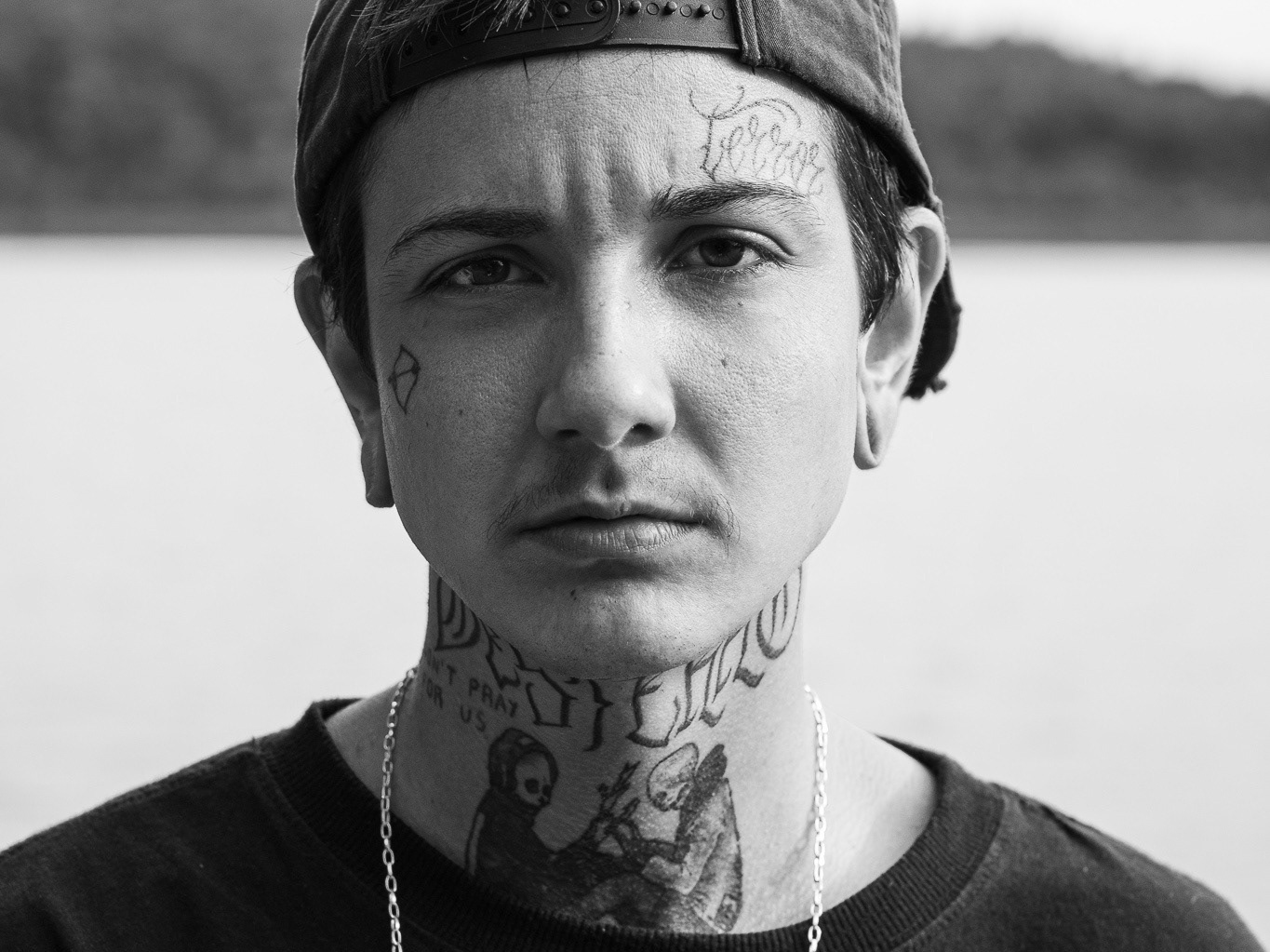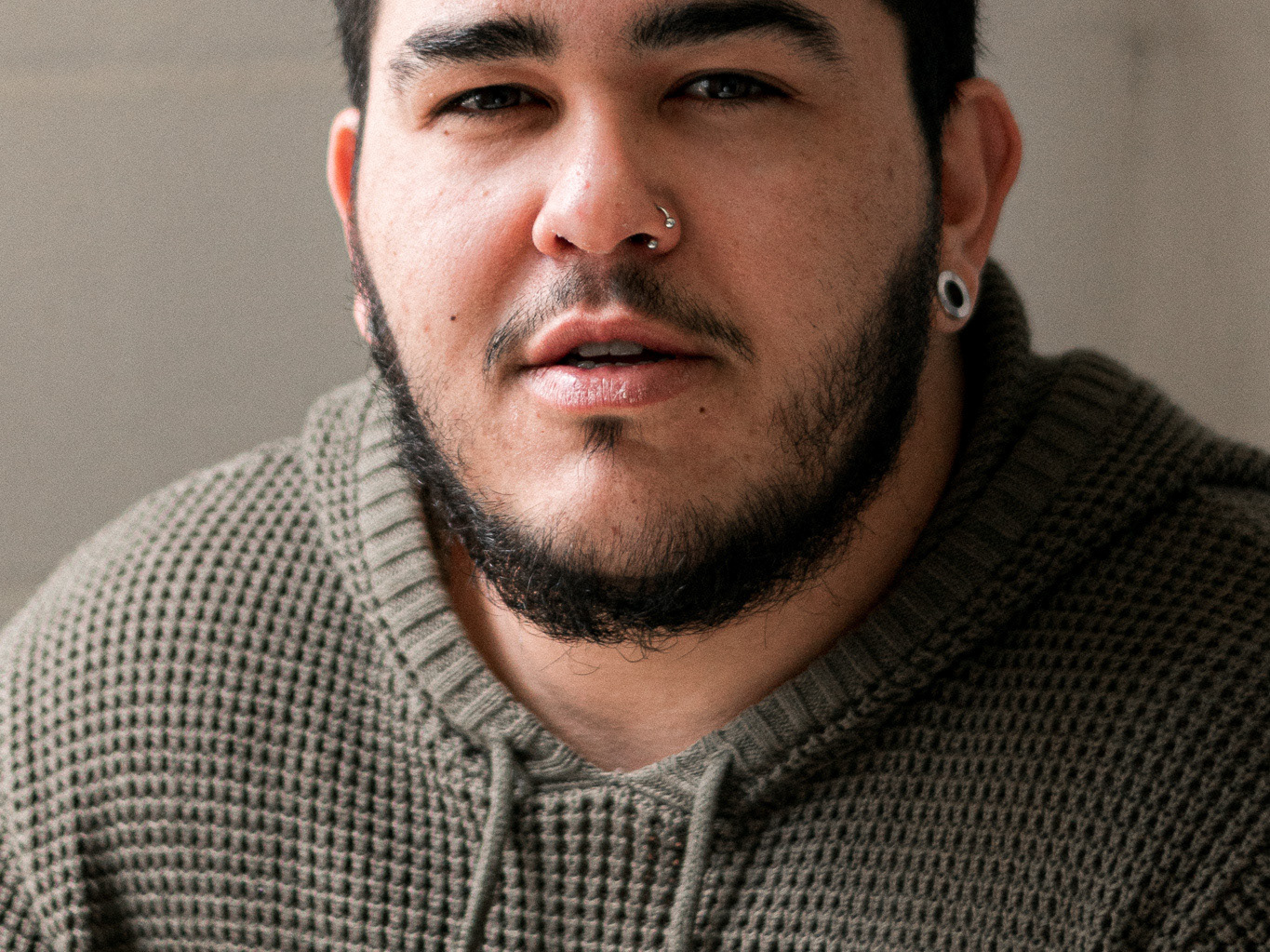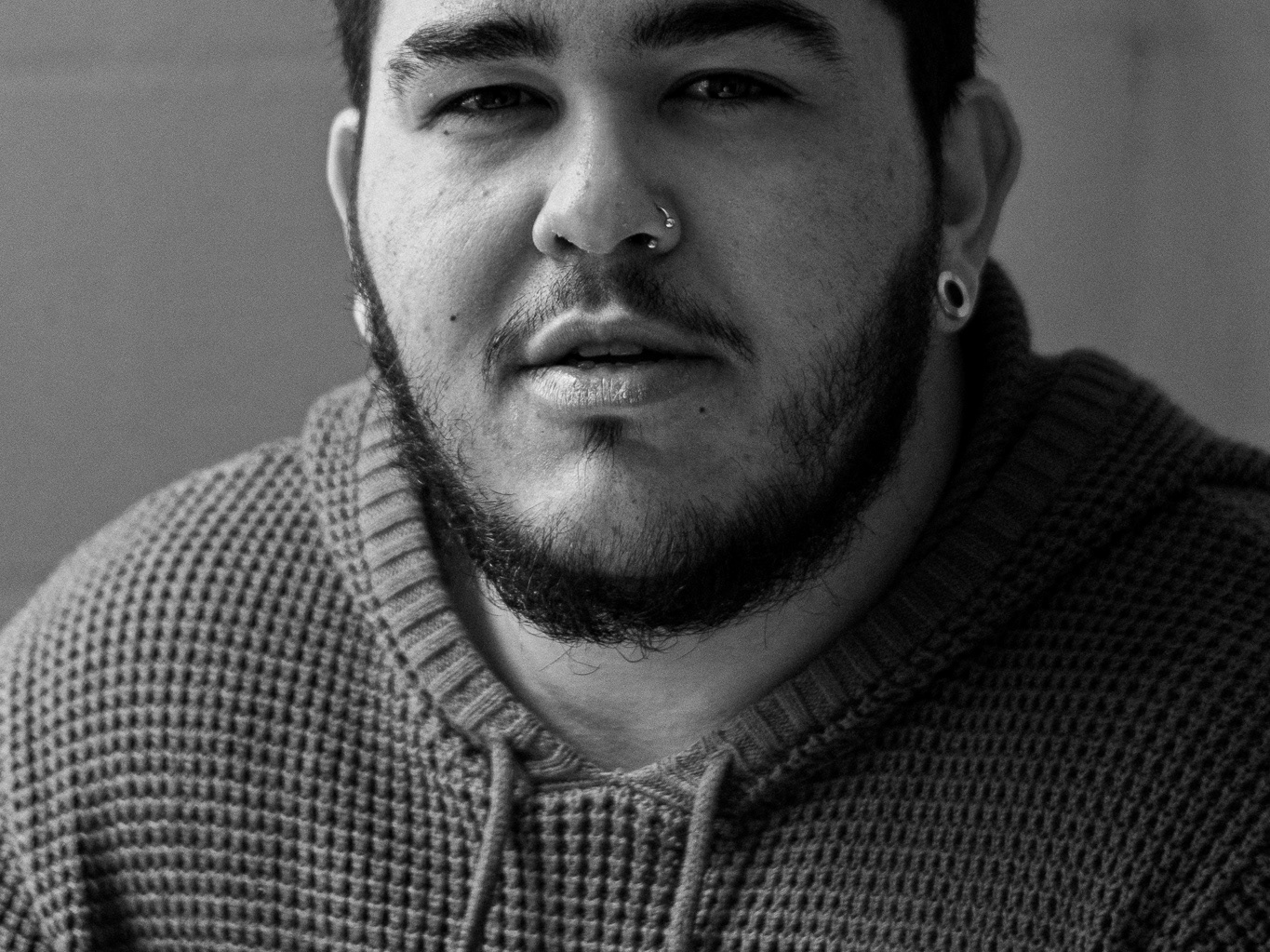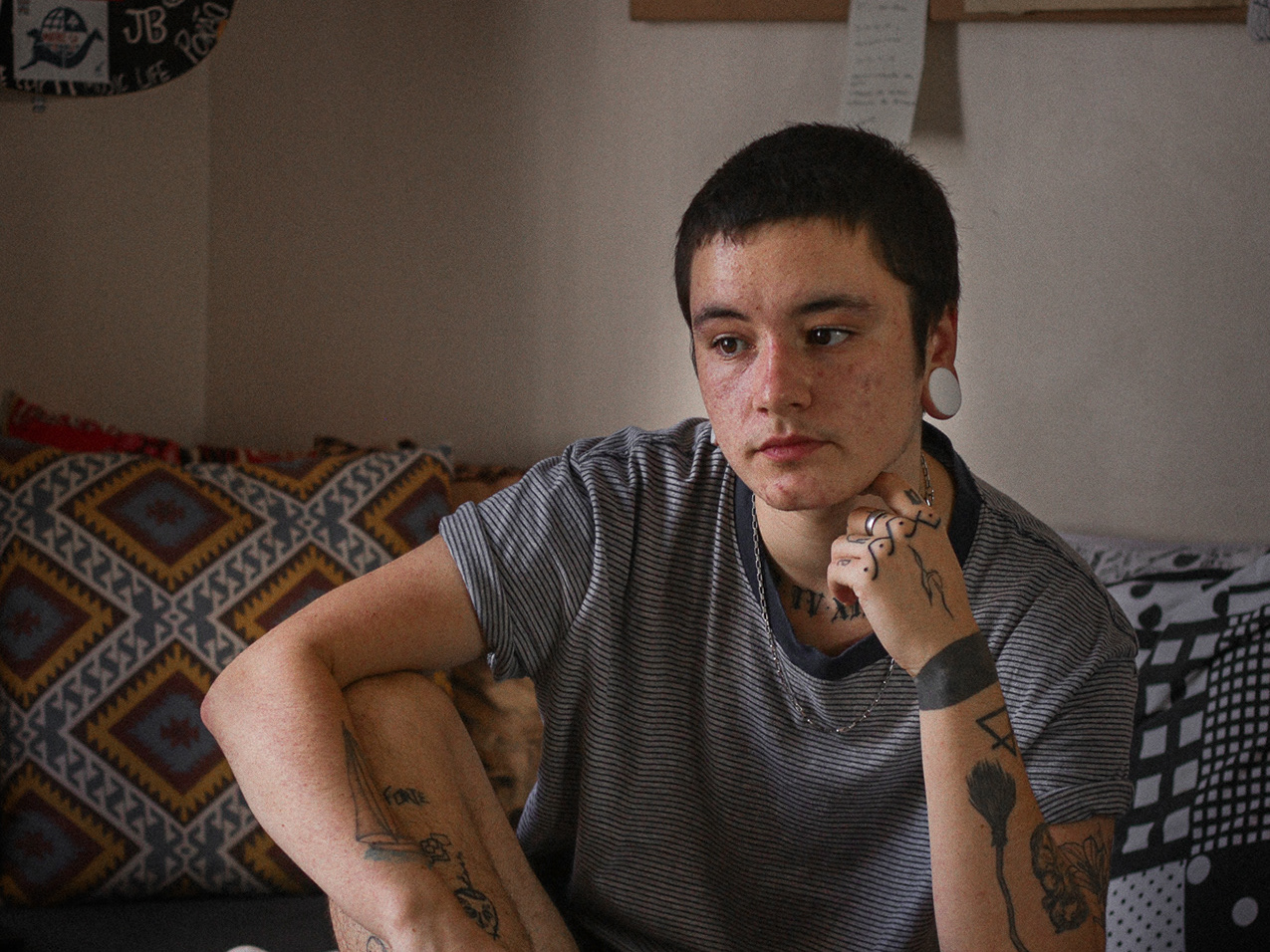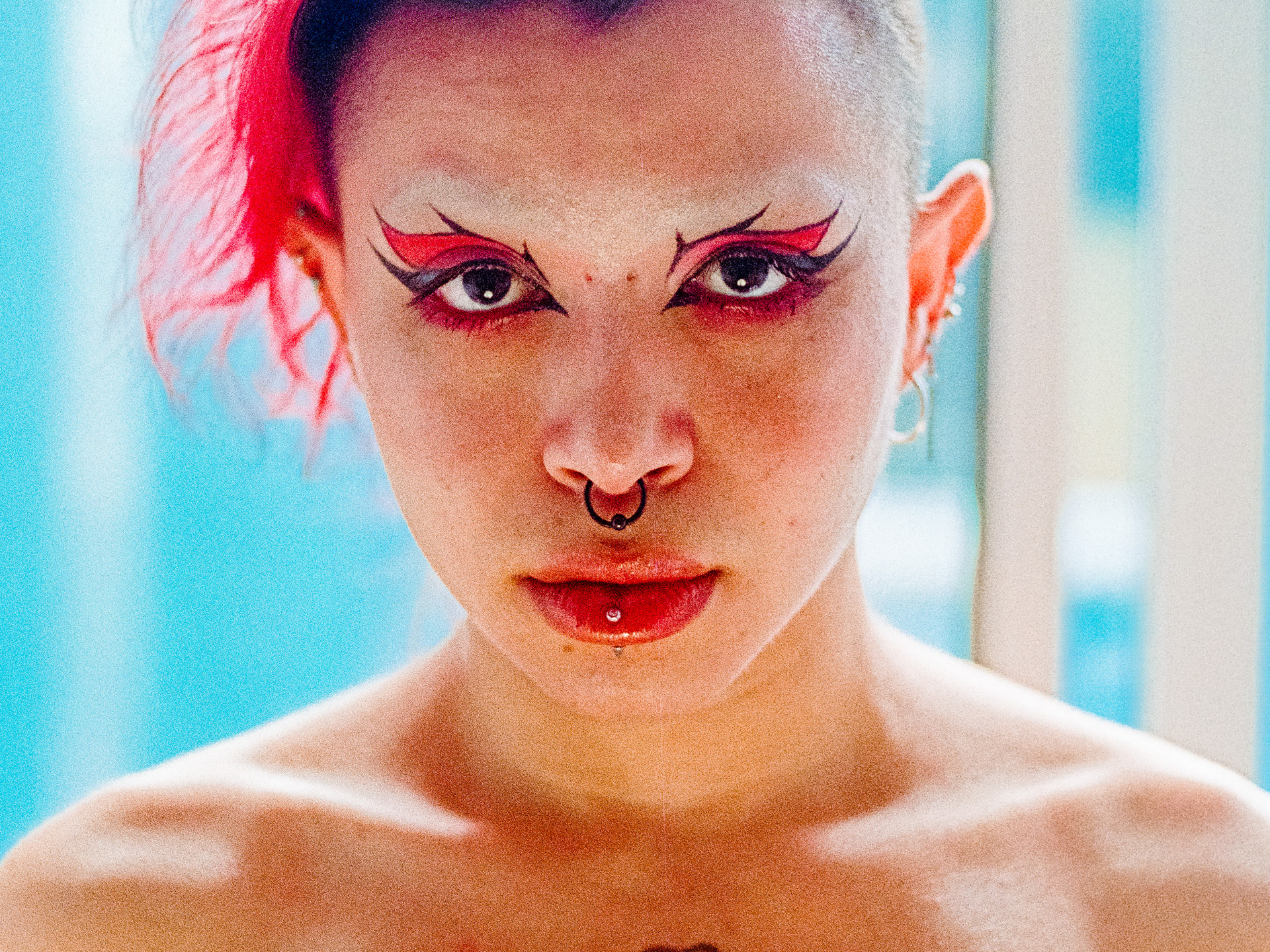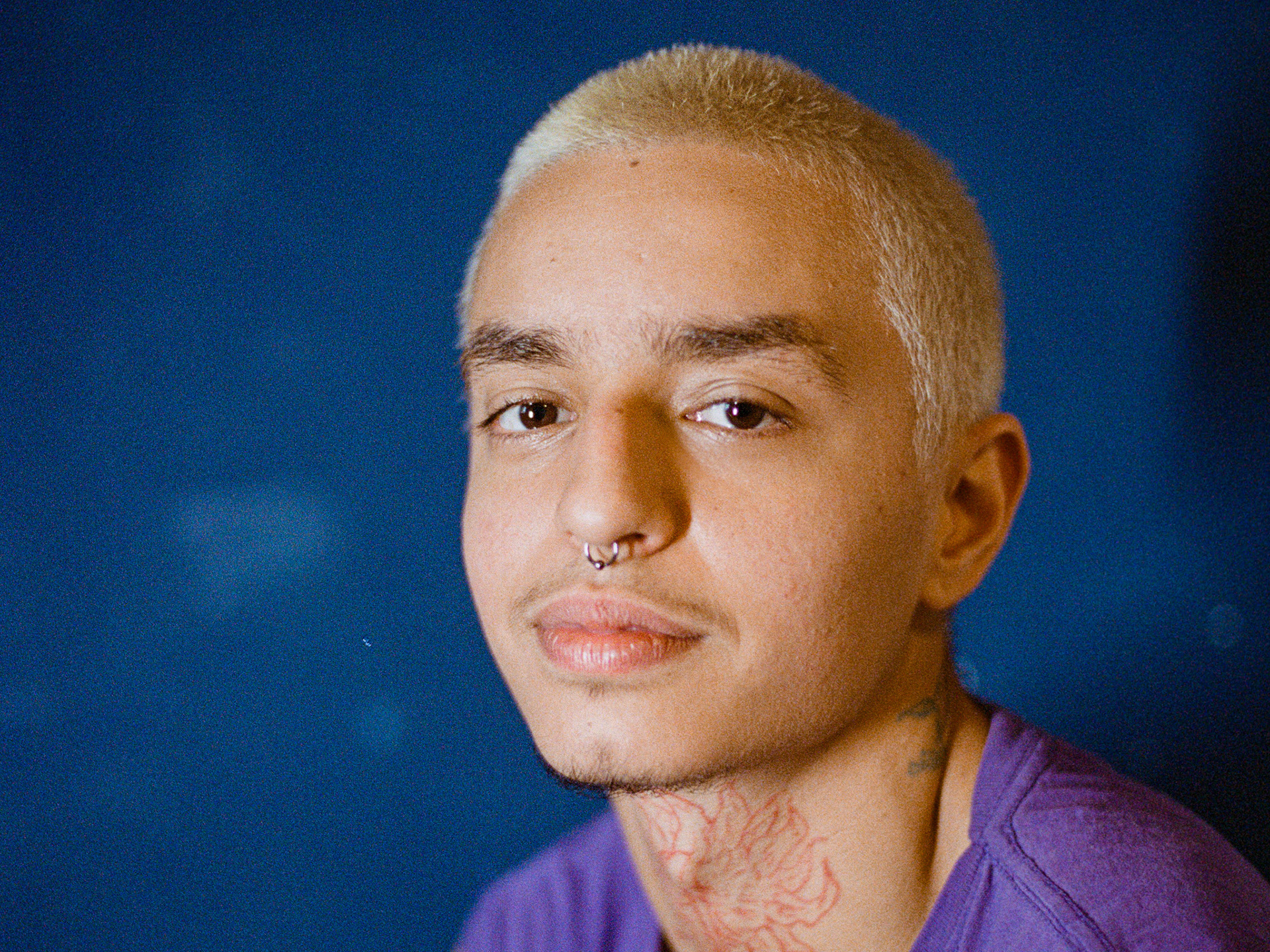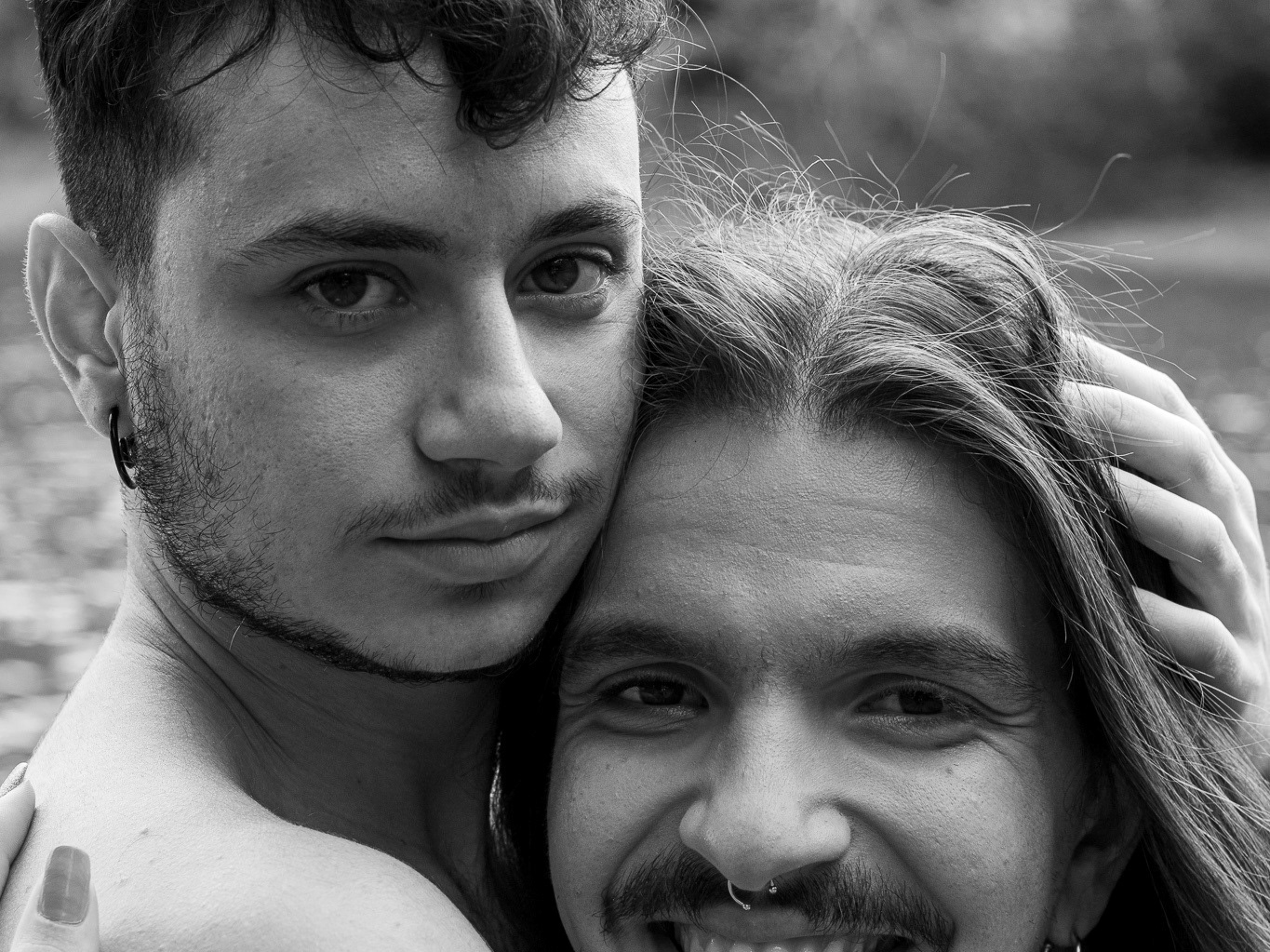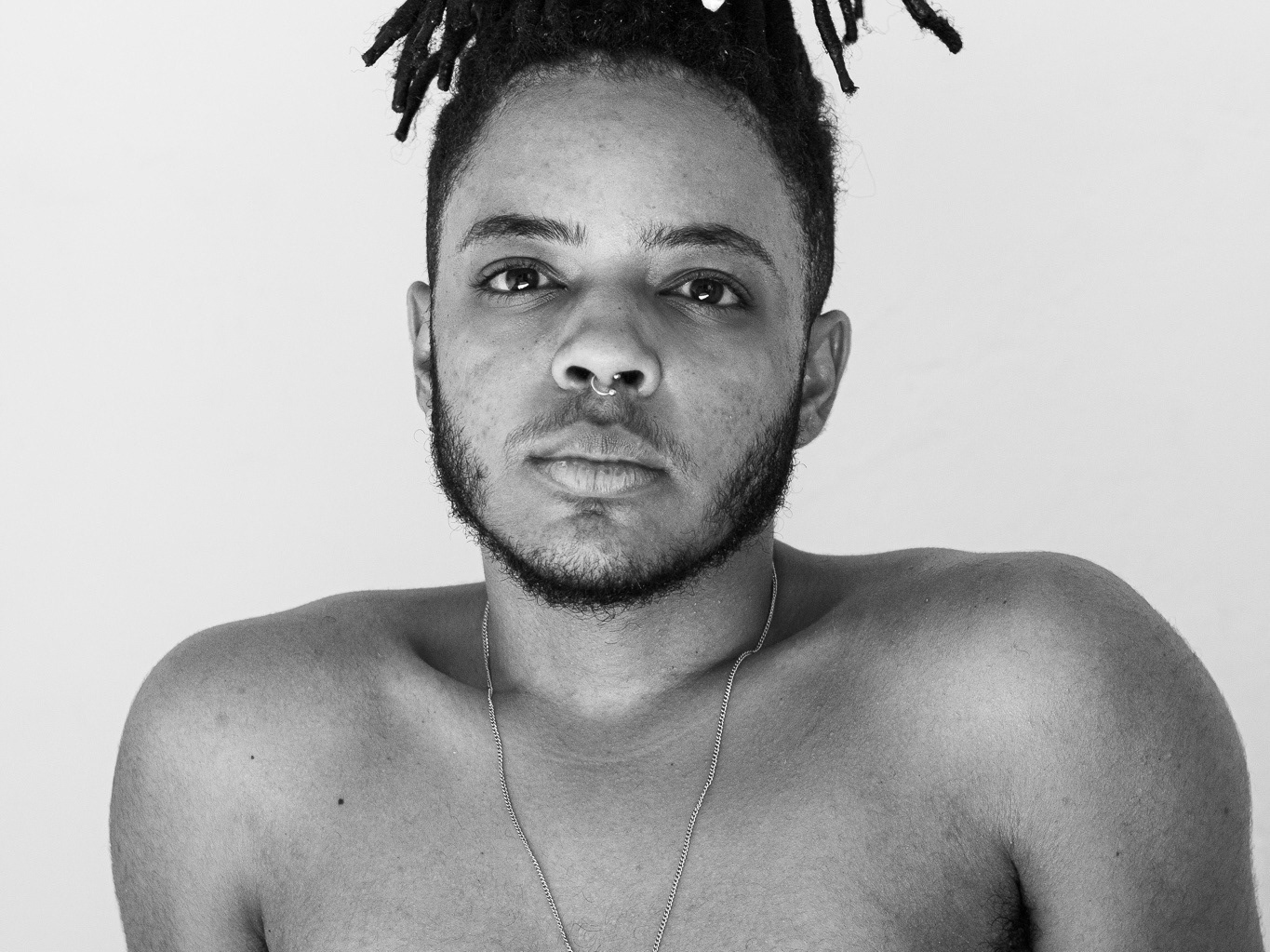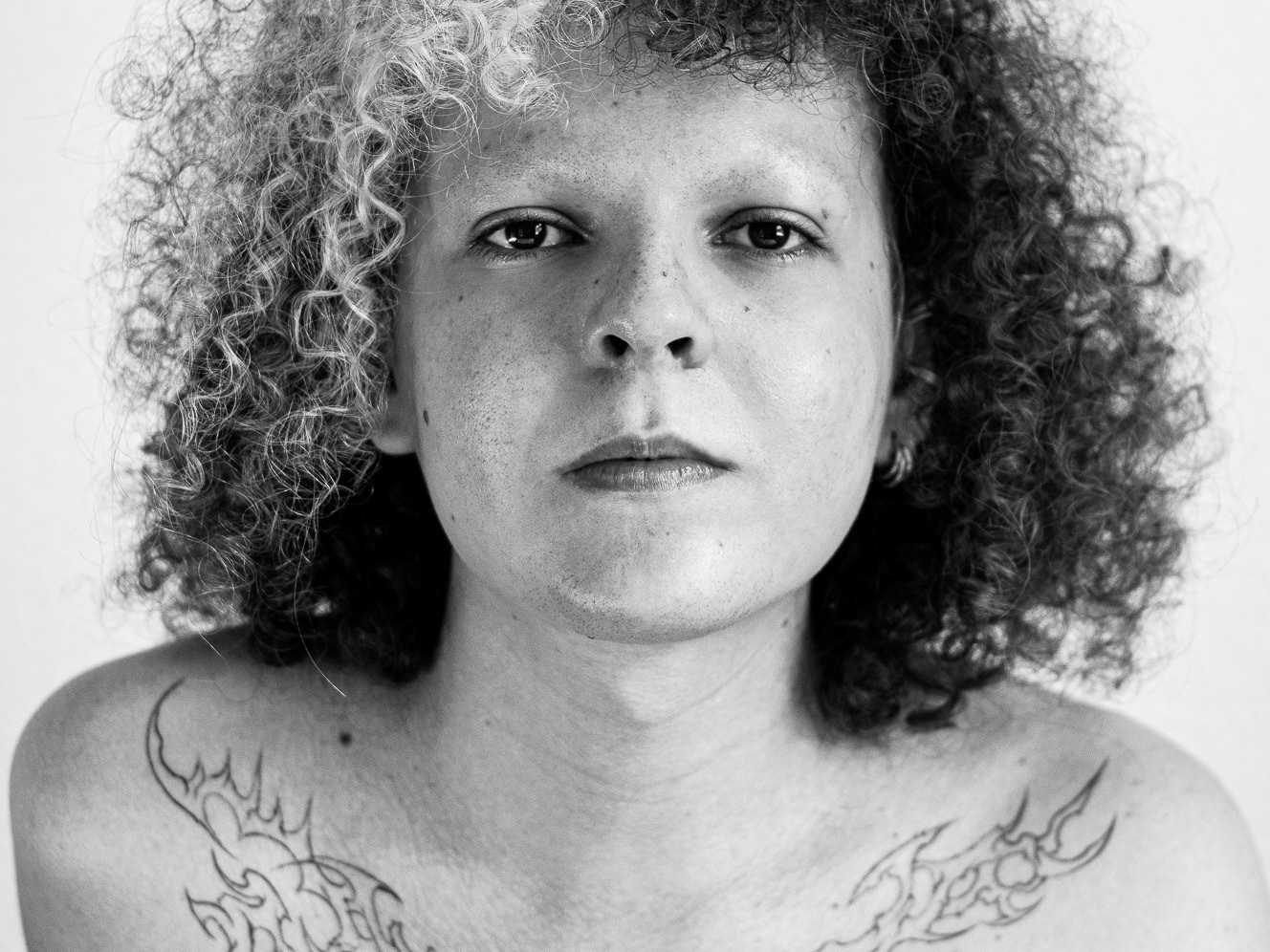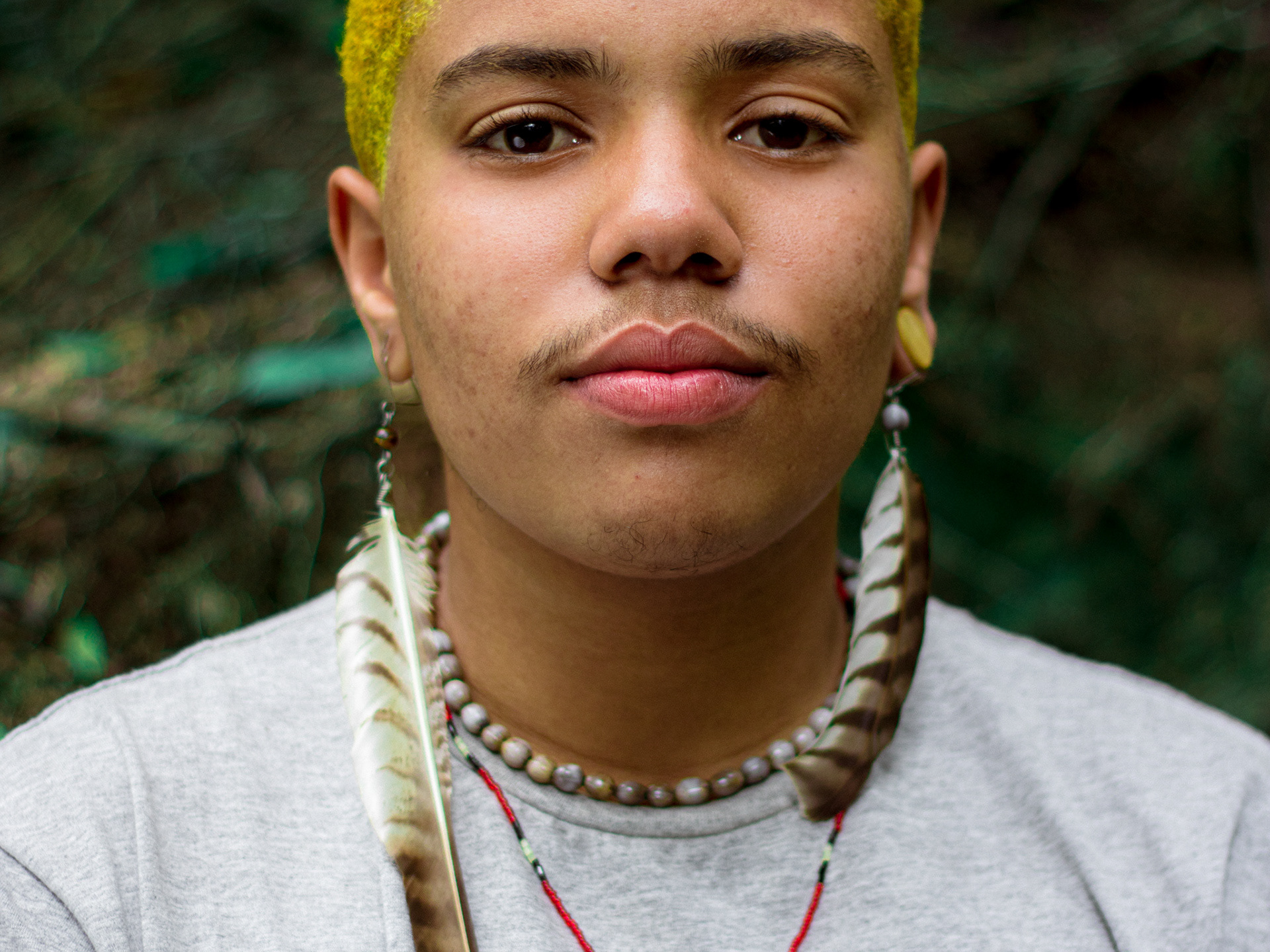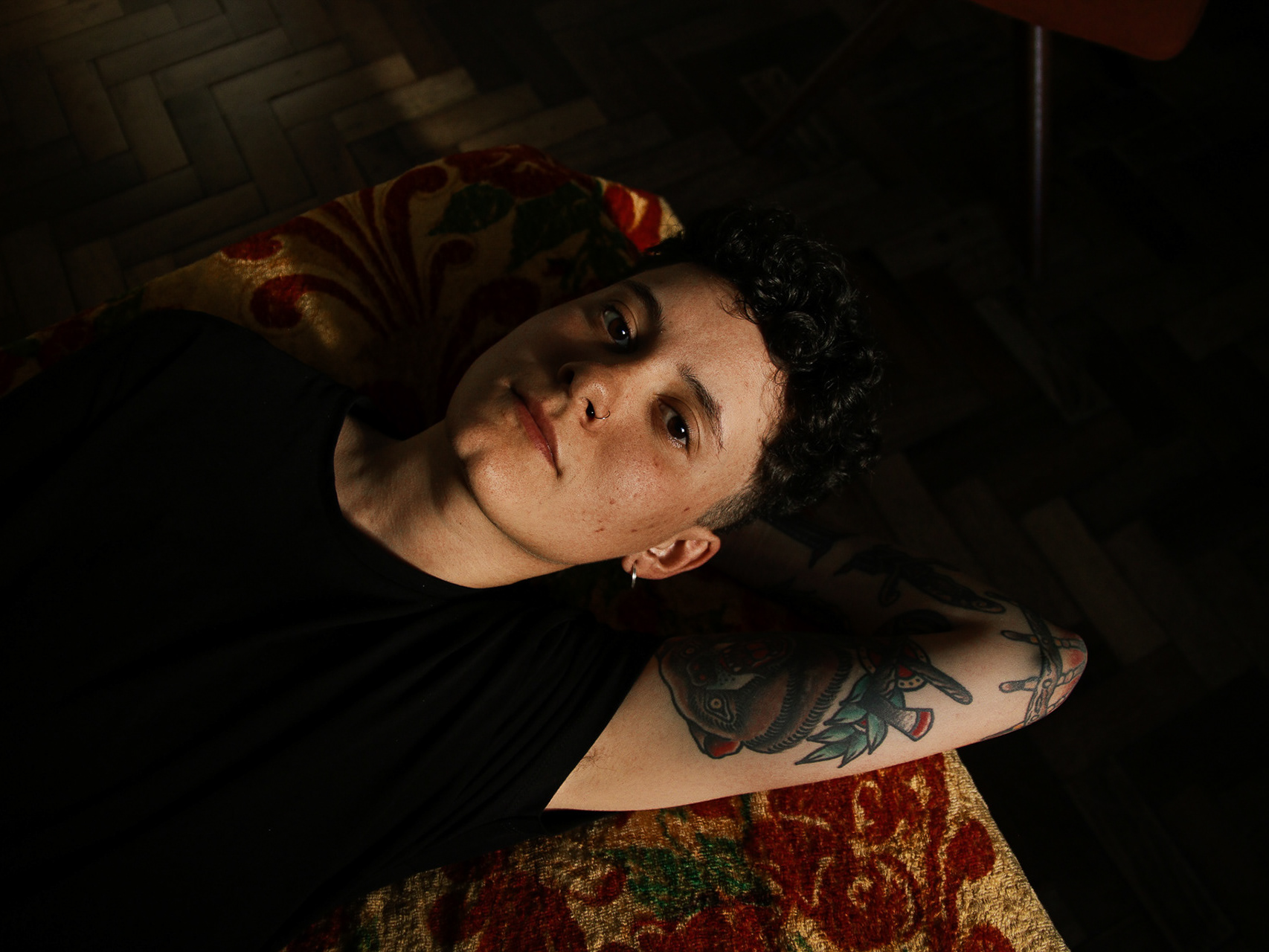I'm Esteve, Esteve Maris, I'm 28 years old, I'm a black man, trans, from the periphery of Sorocaba, in the state of São Paulo, I studied in public school, I took EJA [youth and adult education]... I'm the son of Deise Aparecida Melo, the grandson of Esther Muniz. I'm a poet, I'm a visual artist, I like to experiment with photography, with poetry. I take a chance on video editing. I think this is a little bit of who I am.
I was trying to finish high school in 2017 through EJA, I had been trying for years. I had a lot of support from Andressa, a person I dated at that time, because she's a middle-class girl and she studied at a private school, so she understood about ENEM [High School National Exam], SISU [Unified Selection System], university vacancies, student assistance and so on. She said "man, I really wanted you to get into university, I want to do everything I can to help you. I think it's a rich opportunity for you, especially because of your origins", so I said "dude! Come on then! Let's go, let's give it a try! I accept your help". She gave me several books for me to study. I studied and in a short period of time I finished high school and started studying for ENEM [High School National Exam]. So, we searched together for universities where my grade would fit, we also looked for student assistance and FURG [Federal University of rio Grande] was the one that provided the most in the sense of student assistance because it had a [free] student residence, transportation assistance, food assistance. This gave me a boost, I tried it and it worked, in 2018 I came to FURG.
I came with only 200 brazilian reais, because of Rika, who is my friend and also a trans person - I'm going to use she/her pronouns, but she's in the process of understanding her gender. She supports me and has been supporting me for a long time. I had no money to come. I didn't even have money for a plane ticket, it was my partner's mother at the time who paid for my ticket. When I managed to come, Rika gave me 200 reais and it was the money I had. I had nowhere to get more, I had only food, transport and no housing because I still had to go through the university process. So I got the accommodation. Rika told that there was someone coming to Rio Grande who needed accommodation, she spoke to Muna and she gave me Raiane's contact and she got me accommodation at her house. I stayed there for a couple of months and soon got a room. I sort of got a room... It was my friend Raiane's vacancy, but she said "stay in this room and we'll find a way for you not to leave it". Then, okay, when the result came out, PRAE [Dean of Student Affairs] dismissed me, they said... That my humiliation was not enough. My story, my social and financial conditions were not enough - it happens, right? But I went to PRAE and said "look, I'm not leaving, I can't leave. My mother took out a loan for me to come here" - because I had to come two times to Rio Grande, my girlfriend's mother paid the first ticket, the second was my mother. She took out a loan that she's been paying off until today. I've been here for four years, so think: how much was this loan? The plane ticket was over 1k at that time. Then I told PRAE that I couldn't leave, that it was impossible, and I said "and I'm not leaving because it's the only opportunity in my life. It's the big chance I have to ascend in some aspect socially. I will not let go of this opportunity to be at the university. You have an assistance program, I need to be assisted, I have socioeconomic vulnerability, I need this place! I will not leave! If you send the Police to get me out of the house, I will get a tent and install myself in front of PRAE, understand? You'll have to keep taking me out of all spaces, because I'm not leaving. I have a vacancy, I have a vacancy at the institution and I deserve this vacancy." Then, for my insistence on staying, PRAE said "okay, you are accepted." After a great humiliation, a great process, I got the vacancy and I've been in the student residence for almost 4 years.
I entered the Pedagogy course - my plans were to graduate in Pedagogy and then to do a postgraduate course in Psychopedagogy, so that I could work in the clinic too, so that the classroom was not my only possibility. I entered Pedagogy, did the first semester, [I was feeling] powerful! I only failed one subject, something that rarely happens, because, generally, freshmen fail all subjects. Then I got to know the Arts center, people from the arts, I started hanging out with them... I gave myself the chance to change course. There is a process where vacancies from evasion and dropouts can be used by other people. Then I did the process and it didn't work. I continued, I did another semester of Pedagogy. I did the process again and in the following semester, I got it, I went to Arts.
In the first month I met a girl named Violet Anzine Baudelaire, from room 101 of my student residence, and she was looking for a roommate because her roommate was going to live at Casino with Raiane. We liked each other, had great conversations, and she said "if you want to come live with me, I'll be very happy." I went to live with her and met Jamile - she is from Literature and Violet is from Archeology. Jamile talked about some undergraduate research vacancies at DAC [Art and Culture Directory] and that she thought that I... Before leaving Sorocaba, I had participated in a theater play, I had performed with a group... Then she said that maybe I would be interested because I was from Theater. I did the interview and it was super cool. On the same day - I was here for a month with only 200 reais - Débora, who is the Director of DAC, loved me, liked my story a lot and I entered the undergraduate research. I got it in the first month, I was very happy. I've participated in different undergraduate research within DAC; until today DAC welcomes me a lot. I'm talking about this because it was a way for me to stay here, because my mother was only receiving 400 reais because of the loan. My mom helped me not need anyone from my family to stay here, because I could afford at least the basics. The basics which are washing powder, toilet paper, toothbrush, toothpaste, shampoo, cleaning products, and underwear that from time to time need to be changed (laughs). Right? They don't last forever! (laughs) So the research was a way for me to stay and I'm very grateful to Débora, Jamile, Violet - they were key people for me to stay here at FURG. That was my beginning here. After, I had other research scholarships: culture promoter, I've already organized a book, I've promoted soirees... We also produced institutional fanzines. Anyway, many things. I've already exhibited, I've participated in two exhibitions: one with video at Fresta and one with photographs at Foto Fluxo; which is something I'm also participating in this year with "Corpas Invisíveis", a photography project.
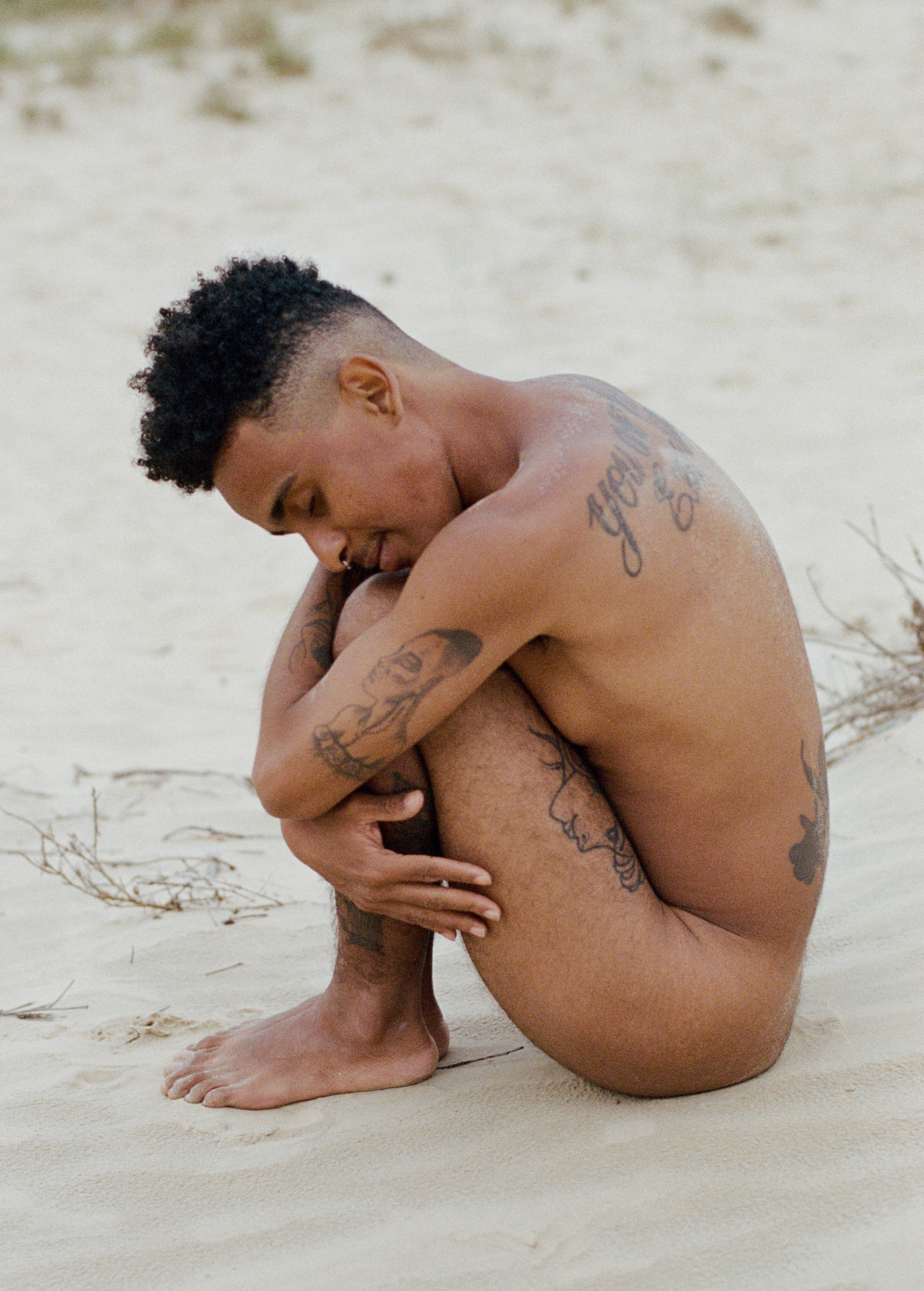
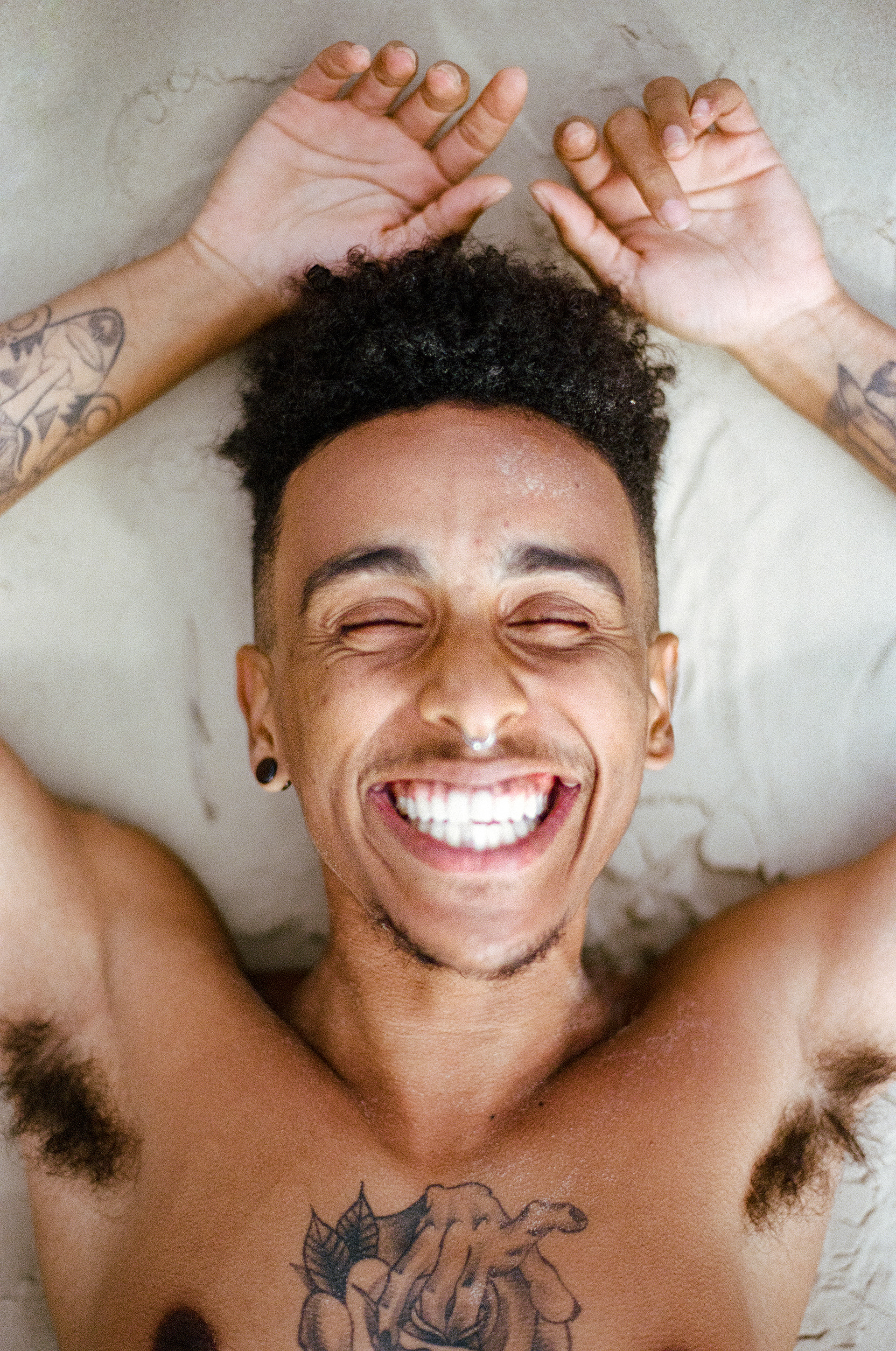
[Film photography - developed and scanned by Lab:Lab]
Before 2016, I had some crises. I had acute psychological conditions, I had very fragile moments of my mental health, I was hospitalized. Deep down... I was still confused, but there were some things that were very right for me. I no longer wanted to sustain a female identity, I knew I didn't want to assert myself as a woman. I didn't see myself as a woman. I wanted other markers on my body, I wanted to try other things with my body. Of course I wasn't aware that my body would be seen in a different way and that my identity would change with the way people would recognize me, but, at that time, I was like, "Man, I'm not a woman. I'm not a woman." Then I told my mother, who is the person I trust the most, she always knows everything. I started to question my identity and I told my mother, she was a little transphobic, she said "look, you're my little girl, you're my baby, you're my little princess, my little chocolate", she said these words , I'm repeating ipsis literi, exactly as she said. Like "you're my candy, my little princess, my girl. You're not a man, forget this! Take this time to take care of yourself, don't think about this now", and I trust my mother a lot, I have a crazy relationship with her, I said "oh man... Damn, my mother doesn't accept me". I took on that, but already feeling that everything regarding my identity was going to change.
After that, I started dating Andressa, asserting myself as a cis woman. But then her ex-boyfriend started to assert himself as a trans man, I was like "whooh, uhh! This life is crazy", but ok, I came to university, had several experiences... In the first semester I still didn't assert myself as a trans man, but in the second it started to take shape. I started to ask other questions, to look at myself and my identity differently. Among my friends, I first asserted myself as non-binary, I said I wanted them to use neutral pronouns. I used the name Estrela [Star], and it went on. Then I ended my relationship at the end of 2018. I came to FURG and she went to UFMG, we were very far away and I was already asserting myself as a trans man. She identified as a lesbian so maybe she didn't want to date a guy, because anyway... She's also a feminist. And anyway, she has that thing of "death to the phallus", "not man", and all that. It was one of the things I had to think about a lot. It was at the end of 2018 that I started to assert myself as a trans man and began the transition process; that had already started inside the clinic, when my mother didn't accept. So I don't enter university claiming to be a trans man; within the university, from dialogues with trans people - I met Lu, Gabi, Violet, Shay, I met several other trans people - in these dialogues I came to understand that it was possible for me to assert another identity, other than the feminine.
I suffered a bit with some transphobic situations. Every semester in pedagogy we have a class where we start to be inserted in schools classrooms, and I was at the beginning of my transition, I didn't know how... I didn't have a beard or a deep voice - which are very strong gender markers, right? And there was a child who all of a sudden aked me "are you a man or a woman?" We were in the classroom and she asked that, then I said my name, so that she could call me by my name. At the time I said "My name is Estela, if you want to call me by my name, that's it", I didn't say if I was a man or a woman, I said that. Then I searched for my teacher and she was very transphobic, she didn't welcome me at that time. I told her that I was having some anxiety attacks, that I didn't know how to deal with these first insertions and, in this sense, she denied me support for dealing with the classroom.
These people who represent the institution were violent with me, I already suffered with it. But there were other people, who also represented the institution, who welcomed me, held me, gave me affection, gave me opportunities, gave me access, ensured that I had financial resources to stay here. So there are people who respect my time, who are understanding with my time, with my learning processes… There was also a very important person for me during this period, which was Regininha, who is a councilor here in Rio Grande - she is the first trans woman councilor of Rio Grande. It was really crazy, my friend was saying yesterday that there was a day when, in the middle of class, I got up on a table and said "people! I'm not a woman, I'm a man! I'm a man!" I kept screaming that I was a man! And Regininha was in the classroom. It was really cool when I walked into the classroom and saw Regininha. Our contact, our connection, was very fast. We got close really fast, we used to eat together every day, sat together, talked nonsense together, and, oh, she was the person who bought my first T. She was the one who bought my first dose of testosterone. I was broke at that time and she gave me the money; she was super sweet.
She always teased me: "we need a group, we need to form a LGBT group here at FURG, we need to organize ourselves here." She is always very inspiring, always prompting us to mobilize, think about our issues, demand, seek our rights and such. She was really an amazing person to me. She was one of the people who welcomed me the most, well, she was... Just like Violet, just like Luz... she was a very important person for my transition process; it was where I could have my conversations, have other references, because she is a trans woman who was a sex worker, and today she is a councilor. At the time she still hadn't gotten the job, but she was fighting. She was very powerful for me, for my transition process, and she said I didn't need to be like anyone else, she said "you have to be you, don't try to be like anyone else. Be yourself in your own process." She was very important.
Chocante [was also another important person]. Chocante was... Wow... She was a light, a star, she was... She was love. Chocante was power, endurance. Chocante was acceptance, patience, understanding. Chocante was zeal. She was a lot. It's crazy, it's been 11 years and the memories are getting farther and farther away. I have little memory of her, but, anyway, she was a very amazing person. I don't have many words, it's not a word that will express what I could see from the person she was. She was a really generous person, a person who made anyone who was on her side feel alive, because she shook you up, like "come to reality". It was a good mood, it was, wow! It was awesome. I miss her, I miss her a lot. [Screaming] If she was alive! Dude, it would be everything! She's alive in me, she's alive in me. That's it, life is an ephemeral idea too, we don't know when we're going to leave; we know it's going to happen, that's the certainty we have.
I was 17 years old when she passed away, I met her at 15. I was totally cisnormative, I didn't think about anything around body issues. I still hadn't discovered my sexuality; I had already hooked up with some women, but nobody knew, I hid it. I didn't assert myself as a lesbian yet, and she was like "little dyke, little dyke", she played with me. She played and my mother was not like "stop it, my daughter is not", no, my mother accepted - my mother used to accept better because [Chocante] was a spiritual mentor, a person we respect. It was really crazy, I fell in love when I met her, I was enchanted, enchanted! My God! She was a very beautiful, powerful person! That house where she used to live, surrounded by several filhos de santo [from Candomblé and Umbanda afro-brazilian religions, filhos de santo are mediums prepared to receive a spirit or divinity]... I don't know, she made me feel very safe, I felt at home, I felt that I could be myself, you know? She was the one who started to provoke me to think about these questions and accept who I was, assuming who I was. I was hanging out with girls but I denied, right? Like, "No, I'm not! Anyone can be [lesbian] but me." And, well, I didn't go out much at that time, I was a very stay-at-home person, I was a very committed priest, very dedicated, and I stayed more at her house. I lived with her for a while, we barely left there, we liked to stay there. We had everything too: video games, plasma television, all her cds - she had a lot of cds! She performed several American singers at night in Sorocabana, in LGBT nightclubs. Because she was also Chocante, right? In addition to Ialorixá.
My brother David who took us to meet her; and she was a real find in my life. There was this period when I lived with her and right after, at the end of 2009, at my mother's house, where we were spending Christmas, she had a very bad headache. We finished dinner and left, she arrived with a huge headache and had a very sincere conversation with us - me, Lucas, Sapinho and Renan - she sat down and talked, talked about how we should be more honest with ourselves, that we needed to know that she wouldn't last forever, that we needed to find our way. After that, she started to have a lot of convulsions, and the next day she passed out in the bathroom... After that I didn't sleep anymore. I lived in the house and I didn't sleep because we kept taking turns between who stayed in the room with her to see how she was doing. She had a seizure for five days, she went to the doctor and didn't know what it was - she did all the exams and they didn't find out. On the fifth day, on January 9, she died. When they did the autopsy they found out that it was a brain tumor, it was quite big, it had taken a large part of her brain, and that was it. I lost... It was a terrible time in my life. I spent years... I was 17 and until I was 21, 22, I... Well... Very crazy, I was very lost. I got lost a lot. I went to another pai de santo, I had some conflicts there and decided to leave the house, because I dated a girl and her mother found out and didn't want us to date. Her mother kept us from seeing each other and, I don't know, I distanced myself from religion, from myself; I got lost. I started to use lots of drugs, I started emptying myself around the city corners - it was a very delicate moment, I felt really bad after her death. I didn't recognize myself for a long, very long time. It was a huge loss, a very big one, really. She was an amazing person, a cool person. A person who had been on the streets, ate grass when she was hungry. I think she died being very loved and very respected; we were together with her, right? Her children along with her. Her name was Tainara, she died at 37 I think. (silence)
[Fotografia Analógica - Revelada e digitalizada por Lab:Lab]
I always hated myself. Always. There wasn't a moment in my adolescence when I loved myself, there wasn't. Mainly because everything I used to compose this body was not for me. I didn't choose bell bottom pants because I liked it, I chose bell bottom pants because it was fashionable and because my friends thought it was beautiful. I wore my hair straightened because my mom said it would look better that way. I shaved my hair not because I thought that without hair I was more beautiful, it was because in advertising, in movies, in the media - even nowadays it's something that cis men are doing a lot, this shaved body - it showed that the beautiful body is the smooth one, right? I put on makeup - blush, powder, foundation - not because I thought I looked good with it, but because society said that women who put on makeup are apparently more presentable and prettier. So, it was never me choosing what I wanted for my body. In the process of going to the clinic, I started to... Ah, there's also that, the people I was hanging out with, I started to hang out with many more artists, after 2014, and then I was rethinking things about my body, I started to let my hair grow... Oh, I zoned out a lot already: there was a moment when I didn't want to use soap when having shower, I didn't want to use shampoo (laughs). It was all a process for me to understand, I wanted to know what I wanted for my body, what I liked, what I wanted for my life.
Since 2014 I have been involved in this process of self-knowledge, seeking to know myself better, to know what I like, what I don't like. Nowadays, if I've never eaten any food and someone says it's not good, now I try it. In respect to my body, like, I didn't like wearing skirts, but because skirts were said to be feminine, but after my transition, the way I feel about wearing skirts became nicer, you know? There was no longer that imposing thing that I had to wear a skirt, no! It's because I want to wear skirts now. Like the mastectomy... I don't feel like having a mastectomy because I like my breasts, I think it's so… man, it's my breasts, you know? They make me feel pleasure, they are mine! I do not pretend. Could it be for aesthetic reasons, maybe, who knows? There are people who like the aesthetics of the surgery, the scar. I had problems with my genitalia because it was big - as if it wasn't now, right? (laughs) - and I avoided having sex with people because I was afraid of them looking at my genitals and that made my relationships very difficult because I was an insecure, scared person, a person who was literally afraid to open up (laughs). Today this relationship with my body has been changing, I'm accepting my body, I'm accepting that I was born that way; I was born with breasts. My breasts aren't big, but I wore bra paddings because I wanted men and women to want my breasts, because that way they would be interested in me, you know? That was one way they got interested in me. Bro! Horrible, I felt really bad wearing bra padding. I even used padding to make my ass look bigger - you can laugh! (laughs). It was horrible, man, really bad. I didn't love myself. Nowadays I look in the mirror and I like what I see. I look at my genitalia and wow, I laugh with it, like "cute, wonderful, you're amazing! Wonderful, you're everything in my life, you give me a lot of pleasure". I don't know, I have been trying to really accept my body and also have this quest to experiment with my body. For example: Testosterone was an experiment, I said "Will it work? Let's see if it works." I didn't know, there wasn't anything that could tell me if I was going to like the results or not. I had a craving for having a beard. I date women, men, non binary people.. people, right? And I didn't like kissing people with a beard, but I liked the beard. I wanted to know how it looked on me and I think it's getting pretty good. I think that this whole issue of the relationship with the body is related to being able to see myself - we can't see ourselves, because we look and see our truth and, often, we're not prepared to face our truth because the world tells us that there are standards to be followed: the beautiful has a thin waist, a wide back, a big ass, a big dick, a square jaw; the standard says it has to be thin. So I think the quest for self-love has been very satisfying for me because I've been able to find myself regarding my body - that's been wonderful for me.
[Fotografia Analógica - Revelada e digitalizada por Lab:Lab]
I wanted to say that this contact with the [documentary film] Intransitivo and with Ser Trans were very important for me in recent times, in this transition process. You - both you, Gabz, and the crew from Intransitivo - made me have more trans references; now I have other trans stories to tell. This, I think, is fundamental for me to understand that I'm not alone, I think this is very important, the exchange that is accompanied by affection, acceptance, respect; you welcome each other, you welcome each other with respect, with affection, this is very important because we are in this search for equals, in this search for people who think like us, who speak like us, who dress like us. We fail to recognize the other, and, in the process of the film Intransitivo, we saw how much diversity there is, how we are multiple, diverse. It's not a lot of trans people with very similar stories, they're totally different stories from each other; this helps me to exercise otherness, to recognize difference and recognize it as something important. You helped me with that, to exercise alterity in which the other and what the other is, for simply being, is already very important, you know? And that's something we've been distancing ourselves from more and more, because we're always looking for - it's a philosophical question, too, this search for "being", right? - people who don't make us uncomfortable; not that we have to accept things that make us uncomfortable, but things that move us, but we're always trying to keep in the same place. I think that's it: you helped me move, moved me to be able to see other experiences, other realities. This is very important for me, to be able to continue my journey by understanding and recognizing that we are diverse, multiple, no one is equal to another, no story will be equal to another. We can have many things that we identify with, but the diversity is there, it is real, it is present. I really appreciate all of this, it's very important to me and I think it's important for a lot of trans people and also for cis people who are partners. This movement you make with art is really important.
Esteve Maris
1993
Son of Deise, grandson of Esther, salty as sea's memories, ephemeral like everything that is here on earth, is transformed with the breaking of waves. Honored like his ancestors, carries in his eyes the force of the arrow that pierces bodies.
Trans man
He/him
2 years and 7 months on hormones
@_efemeroo
1993
Son of Deise, grandson of Esther, salty as sea's memories, ephemeral like everything that is here on earth, is transformed with the breaking of waves. Honored like his ancestors, carries in his eyes the force of the arrow that pierces bodies.
Trans man
He/him
2 years and 7 months on hormones
@_efemeroo
*essay from November, 2021, Rio Grande (RS), Brazil
Project financed by the notice resulting from the Term of Consensual Commitment signed by PRDC-RS/MPF as a result of the early closing of the exhibition "Queermuseu - Cartografias da Diferença na Arte Brasileira"
-
This project was idealized and is made by Gabz, a trans non-binary multiple-language artist. Ser Trans is a project that portrays and also makes room for trans, travestis and non-binary people to be the protagonists of their own stories. We are seeking for representation in front and behind cameras. This project started out of urgency. Ser Trans is made also in collaboration with Lau Graef, transmasculine artist, visual arts student and autonomous activist; Luka Machado, travesti, actress, visual artist and activist; and Morgan Lemes, black trans man, screenwriter, researcher and photography assistant.
Ser Trans is autonomously produced by trans people and all content is offered for free. You can sustain this project by sharing it with friends and making a one time or recurrent donation - any value is welcome. For early exclusive access to all content, subscribe to the project's Patreon. To know click the link bellow. Thank you for supporting a project made by trans people <3
Autorretrato de Gabz revelado por Eloá Souto, digitalizado por Lab:Lab
